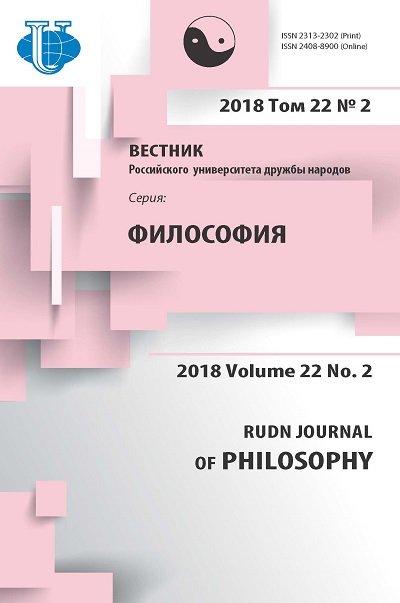The principle of reductio ad absurdum as an ontological problem
- Authors: Anisov AM1
-
Affiliations:
- Institute of Philosophy of RAS
- Issue: Vol 22, No 2 (2018)
- Pages: 149-157
- Section: Ontology and epistemology
- URL: https://journals.rudn.ru/philosophy/article/view/18710
- DOI: https://doi.org/10.22363/2313-2302-2018-22-2-149-157
Cite item
Full Text
Abstract
The ontological status of evidence is reduced to reducing to absurdity. The problem is that in such evidence, an impossible (or still possible?) Situation is allowed as the initial one. What is the ontological status of such situations, do they have an ontological justification? The answer to this question involves considering the structure of evidence by reducing to absurdity, choosing the appropriate logic and searching for an adequate ontology. The article shows that in the classical calculus of predicates of the first order, proofs by reduction to absurdity are included as a special case of proof by contradiction. The intuitionistic predicate calculus uses evidence to reduce to absurdity, but evidence from the contrary is not accepted in it. Further, the key concept of “absurdity” is discussed. It is shown that the treatment of absurdity as nonsense leads to a dead end, because the problem of meaning does not have an adequate solution in modern science. We can not guarantee the presence of a semantic meaning for correctly constructed expressions of the sign system, but we can ensure the presence of a denotational value for such expressions in artificial sign systems. As applied to our problem, this indicates the need to search for the denotational significance of contradictions. Since the models of logical calculi are constructed by means of set theory, the domain of the search is narrowed to the choice of an appropriate set theory. The modified set theory ZF is considered in which the axiom of the existence of an empty set is replaced by its negation. In this case, it is possible to give the denotational significance to the contradictions, but then the contradictions of the type A and not- A get an ontological justification, since both A and non- A are fulfilled.
Keywords
About the authors
A M Anisov
Institute of Philosophy of RAS
Author for correspondence.
Email: a.m.anisov@yandex.ru
-
12/1 Goncharnaya Str., Moscow, 109240, RussiaReferences
- Anisov AM. Sovremennaya logika. Moscow, IF RAN, 2002. (In Russ).
- Anisov AM. Ontologicheskaya tipologiya znakov. Logiko-filosofskie issledovaniya. Vyp. 4. Moscow, 2010. (In Russ).
- Brodskii IN. Otritsatel'nye vyskazyvaniya. L.: LGU, 1973. (In Russ).
- Van Hao, Mak-Noton R. Aksiomaticheskie sistemy teorii mnojestv. Moscow, 1963. (In Russ).
- Vopenka P. Al'ternativnaya teoriya mnojestv: Novyi vzglyad na beskonechnost'. Novosibirsk, 2004. (In Russ).
- Grishin VN. Reduktsiya aksiom svertyvaniya dannoi glubiny k aksiomam svertyvaniya men'shei glubiny. Issledovaniya po teorii mnojestv i neklassicheskim logikam. Moscow: Nauka, 1976. (In Russ).
- Dragalin AG. Matematicheskii intuitsionizm. Vvedenie v teoriyu dokazatel'stv. Moscow: Nauka, 1979. (In Russ).
- Dragalin AG. Konstruktivnaya teoriya dokazatel'stv i nestandartnyi analiz. Moscow: Editorial URSS, 2003. (In Russ).
- Ieh T. Teoriya mnojestv i metod forsinga. Moscow: Mir, 1973. (In Russ).
- Karri H. Osnovaniya matematicheskoi logiki. Moscow: Mir, 1969. (In Russ).
- Keisler G., Chen Ch.Ch. Teoriya modelei. Moscow: Mir, 1977. (In Russ).
- Koen PDj. Teoriya mnojestv i kontinuum-gipoteza. Moscow: Mir, 1969. (In Russ).
- Kuratovskii K., Mostovskii A. Teoriya mnojestv. Moscow.: Mir, 1970. (In Russ).
- Mendel'son E. Vvedenie v matematicheskuyu logiku. Moscow: Nauka, 1971. (In Russ).
- Mostovskii A. Konstruktivnye mnojestva i ih prilojeniya. Moscow.: Mir, 1973. (In Russ).
- Pavlov SA. Logika s operatorami istinnosti i lojnosti. Moscow: IFRAN, 2004. (In Russ).
- Plisko VE., Hahanyan V.H. Intuitsionistskaya logika. Moscow: Izd. meh-mat. f-ta MGU, 2009. (In Russ).
- Sovremennyi slovar' inostrannyh slov. Moscow: Rus. yaz., 1993. (In Russ).
- Frege G. O smysle i znachenii. In: Frege G. Logika i logicheskaya semantika. Moscow: Aspekt Press, 2000. (In Russ).
- Frege G. Razmyshleniya o smysle i znachenii // Frege G. Logika i logicheskaya semantika. M.: Aspekt Press, 2000. (In Russ).
- Frenkel' AA., Bar-Hillel I. Osnovaniya teorii mnojestv. Moscow: Mir, 1966. (In Russ).
- Hahanyan VH. Sistema NFI, ravnoneprotivorechivaya s sistemoi Kuaina NF. Logicheskie issledovaniya. Vyp. 9. Moscow Nauka, 2002. S. 245—250. (In Russ).
- Ferreirós, J. Labyrinth of Thought: A history of set theory and its role in modern mathematics. Birkhäuser, 2007.
- Jech T. Set Theory. New York: Springer, 2003.
- Sheridan F. A Variant of Church’s Set Theory with a Universal Set in which the Singleton Function is a Set // Logique et Analyse, Vol. 59, No 233, 2016. Pp. 81—131, doi: 10.2143/LEA.233.0.3149532.
















